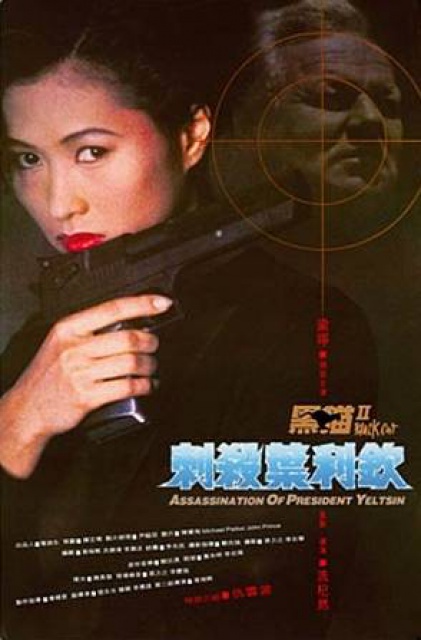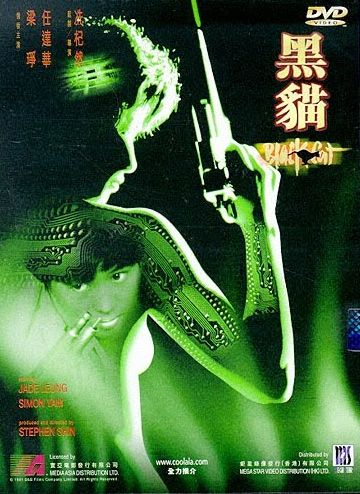★★★½
“Leon, if Matilda had been adopted by Stansfield, instead of Leon.”
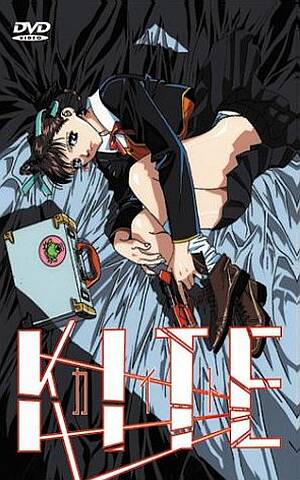 Concerns about some content here means Kite has had a tortuous release in the West. First time out, in 1998, it was shorn basically of all explicit sexual content: given the potentially underage nature of the animated heroine, Media Blasters didn’t want to be hit with a kiddie porn charge – laughable though that may seem for a “cartoon”! – and played it very safe. Subsequent releases over the next six years restored first much, in the “Director’s Cut”, then all (“Special Edition”) the footage, but the OAV* might just work better without the sex. It’s hardly as if I finished it and thought, “Y’know, what this really needs is some sequences of the heroine getting molested.”
Concerns about some content here means Kite has had a tortuous release in the West. First time out, in 1998, it was shorn basically of all explicit sexual content: given the potentially underage nature of the animated heroine, Media Blasters didn’t want to be hit with a kiddie porn charge – laughable though that may seem for a “cartoon”! – and played it very safe. Subsequent releases over the next six years restored first much, in the “Director’s Cut”, then all (“Special Edition”) the footage, but the OAV* might just work better without the sex. It’s hardly as if I finished it and thought, “Y’know, what this really needs is some sequences of the heroine getting molested.”
Because the story is interesting enough on its own. Sawa is a teenage assassin, basically mind-controlled by her foster father, Akai: he’s a cop who uses her to mete out vigilante justice to paedophiles, etc. [This is ironic given their relationship, the nature of which even the edited version makes fairly clear.] She meets a young man, Oburi, in much the same situation, and their growing relationship threatens to disrupt the status quo of everyday slaughter. And, “slaughter” is the word, since Sawa’s weapon of choice is bullets that first penetrate the victim, then explode. Cue more irony: in America, even animated teenage sexuality is entirely verboten, but teenage, paint-the-walls-blood-red carnage? Bring it on.
The action is certainly intense, well-animated and directed, though perhaps excessive. Even after falling from a building, through the road, down to the subway – then being blown up, flying back into the air and blasted through an apartment window, some BandAids are apparently all the medical attention Sawa requires. This conflicted badly with the gritty realism of the story, and I also hated the doodling sax soundtrack, which sounded like something rejected by Abel Ferrara for Driller Killer. Otherwise, though, it’s generally impressive and stylish, with a downbeat approach that is refreshing, as well as some spectacularly messy violence.
* = Original Animation Video, a common “straight to video” anime format. It’s only 50 minutes, about standard length for such things. A live-action version, directed by Jorge + Javier Aguilera, produced by Rob Cohen & Anant Singh, was announced earlier this year, but no release date has been scheduled. And No Doubt’s video for Ex-Girlfriend borrowed heavily from Kite – the bathroom assassination is re-staged, almost shot-for-shot, as this video shows.
Dir: Yasoumi Umetsu
Star (voice): Kotomi Naruse, Shingo Oyamada, Goro Shibusawa, Tatsuo Matoba





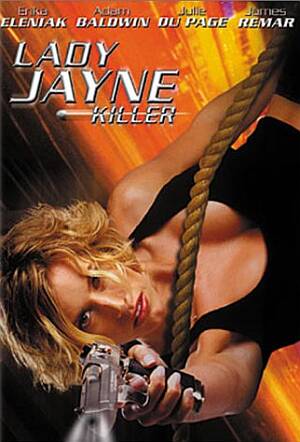 Memo to self: don’t tell your wife the star of a film was in Playboy. Chris’s interest, already somewhat on thin ice, evaporated entirely, pretty much the moment I made that mistake, and I almost had to handcuff her to the bed to prevent a sudden trip to the supermarket. The concept here is kinda cool: Mom Emily (Eleniak) vs. anti-Mom Jayne (du Page). The latter is a hitwoman for the Mob, with 20 kills to her credit when she decides to abscond with a million in cash. She ends up hitching a ride beside Emily and her 16-year old son Kerry (Lelliot) on their way to San Antonio, with the former owners of the money in hot pursuit. And the cops. And the FBI. Then Kerry – when not fantasizing about Eleniak in the shower [cue Chris’s neo-departure!] – decides to solves Mom’s financial problems with thievery of his own.
Memo to self: don’t tell your wife the star of a film was in Playboy. Chris’s interest, already somewhat on thin ice, evaporated entirely, pretty much the moment I made that mistake, and I almost had to handcuff her to the bed to prevent a sudden trip to the supermarket. The concept here is kinda cool: Mom Emily (Eleniak) vs. anti-Mom Jayne (du Page). The latter is a hitwoman for the Mob, with 20 kills to her credit when she decides to abscond with a million in cash. She ends up hitching a ride beside Emily and her 16-year old son Kerry (Lelliot) on their way to San Antonio, with the former owners of the money in hot pursuit. And the cops. And the FBI. Then Kerry – when not fantasizing about Eleniak in the shower [cue Chris’s neo-departure!] – decides to solves Mom’s financial problems with thievery of his own.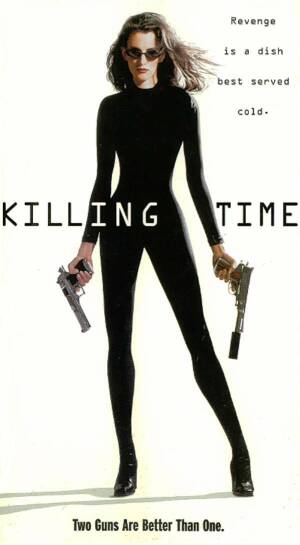 We Brits don’t do girls-with-guns movies: too busy drinking tea and arranging matchsticks, I imagine. This is a rare exception, and works not badly, combining a striking ‘Italian’ hitwoman in Maria (Torgan), with the bone-dry sarcasm of Guy Ritchie – at least, before he started making movies starring his missus, Madonna. Maria is brought in by Newcastle cop Bryant (Fairbrass) after the local crime lord (Leach) leaves a fellow policeman nailed to Bryant’s front door. Only, Bryant can’t afford to pay her, so blackmails some local thugs, led by Charlie (Thirkeld) to kill her after she’s done the job. Needless to say, things don’t quite go as planned, and the dead bodies start to accumulate, in a most non-British way.
We Brits don’t do girls-with-guns movies: too busy drinking tea and arranging matchsticks, I imagine. This is a rare exception, and works not badly, combining a striking ‘Italian’ hitwoman in Maria (Torgan), with the bone-dry sarcasm of Guy Ritchie – at least, before he started making movies starring his missus, Madonna. Maria is brought in by Newcastle cop Bryant (Fairbrass) after the local crime lord (Leach) leaves a fellow policeman nailed to Bryant’s front door. Only, Bryant can’t afford to pay her, so blackmails some local thugs, led by Charlie (Thirkeld) to kill her after she’s done the job. Needless to say, things don’t quite go as planned, and the dead bodies start to accumulate, in a most non-British way.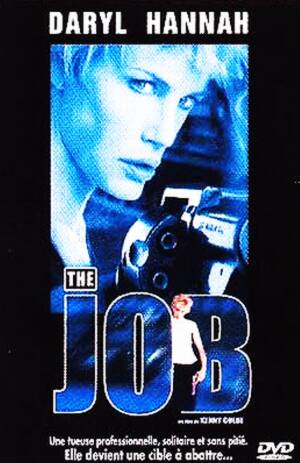 If I ever become an assassin, I will never utter the words “last” and “job” to anyone – it’s just
If I ever become an assassin, I will never utter the words “last” and “job” to anyone – it’s just 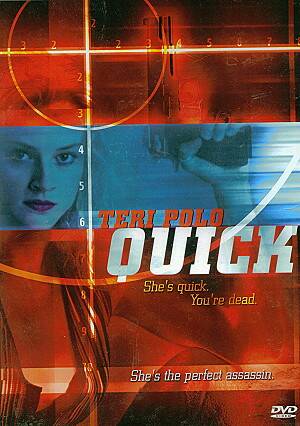 Polo plays Quick, an assassin whose job is to take out mob accountant Brewer (Donovan) after he turns stoolpigeon. When her employer tries to double-cross her, she goes on the run with her target, who has hidden $3m in ill-gotten gains. Her corrupt cop boyfriend (Fahey) also has designs on the money, raising the suspicions of his partner (Carrere, an effective but wasted performance).
Polo plays Quick, an assassin whose job is to take out mob accountant Brewer (Donovan) after he turns stoolpigeon. When her employer tries to double-cross her, she goes on the run with her target, who has hidden $3m in ill-gotten gains. Her corrupt cop boyfriend (Fahey) also has designs on the money, raising the suspicions of his partner (Carrere, an effective but wasted performance).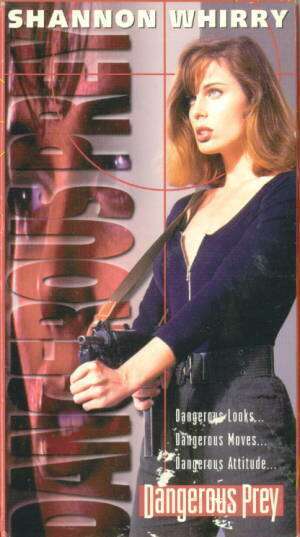 If you
If you 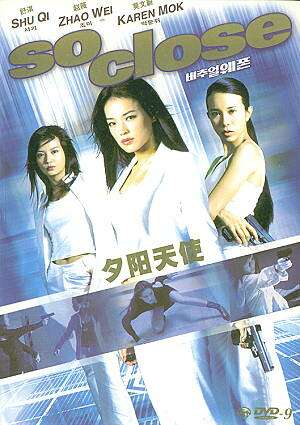 For action alone, this is certainly worth a look, with some stunning and imaginative set-pieces. But the bits between are so badly-handled, I actually dozed off – twice – which is barely permissible in a drama, never mind an action movie. It’s a tale of two sisters, who form a team of assassins: big sis Lynn (Shu Qi, from The Transporter) does the deed, little sis Sue (Zhao) is hi-tech backup, using gadgetry handed down from their father. But the police, led by eccentric forensics expert Hung (Mok), are on the trail, so a client opts to tidy the loose ends by targeting all three women, forcing a partnership between cop and killers.
For action alone, this is certainly worth a look, with some stunning and imaginative set-pieces. But the bits between are so badly-handled, I actually dozed off – twice – which is barely permissible in a drama, never mind an action movie. It’s a tale of two sisters, who form a team of assassins: big sis Lynn (Shu Qi, from The Transporter) does the deed, little sis Sue (Zhao) is hi-tech backup, using gadgetry handed down from their father. But the police, led by eccentric forensics expert Hung (Mok), are on the trail, so a client opts to tidy the loose ends by targeting all three women, forcing a partnership between cop and killers.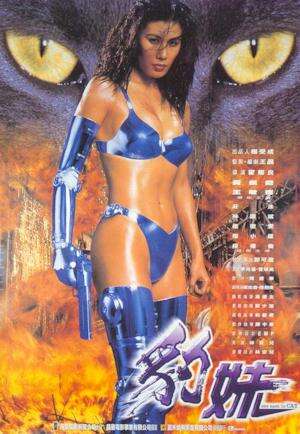 Clarence Ford seems to be after a PG-13 rated version of his hit, Naked Killer, reining in the sex while keeping the action. That it doesn’t succeed is more due to staggering ineptness in the superfluous attempts to give it emotional depth.
Clarence Ford seems to be after a PG-13 rated version of his hit, Naked Killer, reining in the sex while keeping the action. That it doesn’t succeed is more due to staggering ineptness in the superfluous attempts to give it emotional depth. 